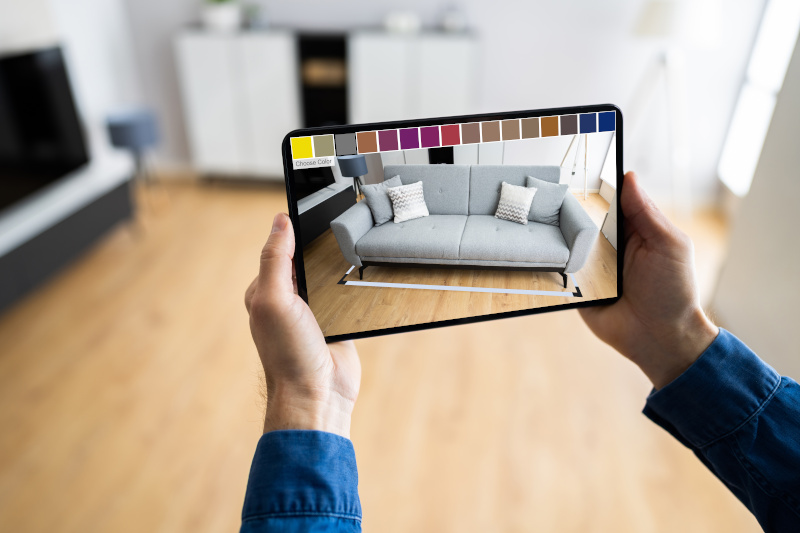You are viewing our site as an Agent, Switch Your View:
Agent | Broker Reset Filters to Default Back to List5 Emerging Technologies That Will Redefine Real Estate
October 08 2023
Emerging technologies are already impacting how real estate professionals can complete daily tasks faster. From automation to computer vision, these game-changing technologies are unlocking new ways to accelerate the day-to-day productivity of real estate professionals.
Here are five emerging technologies that are starting to reshape how to attract, engage, and maintain clients:
1. Artificial Intelligence (AI)
 What is it? Google Cloud defines AI as "a field of science concerned with building computers and machines that can reason, learn, and act in such a way that would normally require human intelligence or that involves data whose scale exceeds what humans can analyze."
What is it? Google Cloud defines AI as "a field of science concerned with building computers and machines that can reason, learn, and act in such a way that would normally require human intelligence or that involves data whose scale exceeds what humans can analyze."
Current state: Artificial intelligence is on its way to dramatically altering and streamlining some of the most time-consuming tasks real estate professionals routinely perform. From customer relationship management and prospect identification and engagement to property descriptions and valuations, AI can help.
AI makes possible predictive analytics, allowing you to find and capture buyers and sellers even before they decide to move. It can determine what content people in your sphere of influence are most interested in. It can then deliver different content to clients and prospects based on monitoring individual behavior.
Creating content – SEO optimized for your website, engaging social media posts, and blog subjects and drafts – can be done nearly instantly and accurately with the proper prompts. Leading AI content tools available today include ChatGPT and Bard, and derivative programs like Jasper and Reword. Vastly improved AI chatbots for websites (and soon Facebook) enable immediate responses to inquiries, enhancing customer satisfaction. AI virtual assistant tools like Productive.ai can also supercharge your client and prospect calls.
Coming soon: AI-powered tools and algorithms can analyze vast amounts of data. Creating local market reports will be a breeze. Reports that can be generated in seconds will offer deep insights, once nearly impossible to gather manually. Producing videos will be easier than ever. For agents who don't like seeing themselves on video, they can select a professional spokesperson. Soon, agents may even use an AI-generated (and licensed) celebrity spokesperson.
2. Computer Vision
 What is it? According to IBM, "Computer vision is a field of artificial intelligence (AI) that enables computers and systems to derive meaningful information from digital images, videos and other visual inputs — and take actions or make recommendations based on that information. If AI enables computers to think, computer vision enables them to see, observe and understand."
What is it? According to IBM, "Computer vision is a field of artificial intelligence (AI) that enables computers and systems to derive meaningful information from digital images, videos and other visual inputs — and take actions or make recommendations based on that information. If AI enables computers to think, computer vision enables them to see, observe and understand."
Current state: Computer vision is available today to some degree throughout all the major MLS technology platforms. CoreLogic, Black Knight, FBS, Rapattoni, dynaConnections, Stratus, and others all work with category leader Restb.ai.
Computer vision is helping agents make every photo uploaded to the MLS ADA-compliant. It automatically tags and labels objects within property photos. An "alt text" entry is automatically generated for each image. Labeling objects automatically creates detailed information about each room (Wolf or Viking stove, hardwood floors, open floorplan, etc.). Moreover, computer vision-powered tech automatically creates property descriptions. They are Fair Housing-conforming, creative and highly detailed and allow agents to edit these descriptions. It's a groundbreaking technology. Computer vision is fast becoming the most used AI-powered tech in real estate.
Coming soon: Computer vision has the potential to forever change search. Instead of the traditional search criteria consumers use today (at least three bedrooms, at least two baths, back yard, etc.) search will be available by specific features. Because computer vision identifies hundreds of objects and features from property photos, consumers will be able to query "homes with white kitchens," "first floor main bedrooms," "homes with a Southern exposure," or "recently renovated homes." The possibilities are endless.
3. 3D Modeling and Virtual Staging
 What is it? "3D modelling is the process of creating three-dimensional representations of an object or a surface," according to FutureLearn. The Zebra adds, "Virtual home staging is when a graphic editor expertly designs a room using virtual decor, generating a highly realistic photograph for prospective buyers to view online."
What is it? "3D modelling is the process of creating three-dimensional representations of an object or a surface," according to FutureLearn. The Zebra adds, "Virtual home staging is when a graphic editor expertly designs a room using virtual decor, generating a highly realistic photograph for prospective buyers to view online."
Current state: While firms like Matterport and BoxBrownie pioneered these technologies, AI is supercharging the capabilities. Also, new firms are entering this space constantly. Not too long ago, only proprietary cameras could render 3D tours and walkthroughs of homes. Now that power is in today's smartphones.
Creating floorplans used to be limited to software from firms like FloPlan, but that's changing too. Most importantly for agents, the accessibility is increasing, and the costs are collapsing. Virtual staging is becoming more commonplace. MLS rule changes are helping to manage consumer expectations. New tech tools allow consumers to tour a home, take a photo or point their smartphone camera at an empty room. Software allows them to furniture they like to fill the vacant space.
Coming soon: AI is altering home design by creating 3D modeling tools that can create an entire home. With newer, lighter AR or augmented reality devices, remote home tours will be further enhanced by 3D modeling. That, plus automatic virtual staging, will be enriched with data.
4. Augmented Reality
 What is it? According to Microsoft, "Augmented reality is an enhanced, interactive version of a real-world environment achieved through digital visual elements, sounds, and other sensory stimuli via holographic technology." Augmented reality, or AR, superimposes images, videos, or sounds onto an accurate worldview, creating a "like you are there" perception and allowing one to interact with their environment.
What is it? According to Microsoft, "Augmented reality is an enhanced, interactive version of a real-world environment achieved through digital visual elements, sounds, and other sensory stimuli via holographic technology." Augmented reality, or AR, superimposes images, videos, or sounds onto an accurate worldview, creating a "like you are there" perception and allowing one to interact with their environment.
Current state: AR advancement is accelerating as giant headsets become smaller. In some cases, headsets are eliminated altogether.
With AR, today's tech-savvy real estate agents can create interactive, immersive virtual tours of properties. Potential buyers – in any time zone – can explore every nook and cranny of a home. By overlaying virtual elements onto the real world, AR can enable someone to see a home more personally. Through AR applications, buyers can visualize how they would furnish and personalize a property. This technology saves time and helps clients envision themselves in a prospective home more effectively.
Coming soon: Ray-Ban is helping to popularize smart tech in glasses by releasing Smart Glasses (i.e., Google Glass). While these are not AR glasses, they are clearing a path for AR tech to go smaller. They feature a dual 5MP camera, built-in audio, voice control, and touch control and come with their charging case. The movement towards no headset AR and VR is also accelerating, with new software helping to advance this tech.
5. Automation
 What is it? As UpTech notes, "Real estate automation is a way to reduce manual work and let your instruments do more work for you."
What is it? As UpTech notes, "Real estate automation is a way to reduce manual work and let your instruments do more work for you."
Current State: The impact of automation in the real estate industry is growing with new speed. Credit goes to the integration of AI and machine learning. Marketing automation interfacing with CRMs may be today's biggest target. After all, research from the National Association of Realtors shows that just one in four real estate agents use a CRM daily or nearly daily. Yet agents using CRMs are more productive and successful. AI that delivers automation features can make a CRM easy to use – a huge breakthrough.
Moreover, agents know that "set and forget" marketing claims are more exaggeration than reality. However, that's changing with AI. One example is the incorporation of machine learning into the largest real estate marketing platforms. An example is Delta Media's recently launched DeltaNET 7. AI-powered automation will be a game changer for real estate agents.
Automation can achieve true "set and forget" outreach because content will match the client or prospect's shifting interests. For example, personalizing agent newsletters at this level automatically causes engagement to soar. The same is true when machine learning integrates with social media posts. By tracking interaction and adjusting copy, the effectiveness of each post increases.
Agents often struggle with creating compelling content for their emailed newsletters. It can be one of the reasons they experience poor open rates. But emails work much better when machine learning delivers the right content to the right client at the right time.
New AI chatbots are also becoming smarter and more effective. When they are used on an agent's website, these new bots can serve prospects 24/7. Chat bots today can help pre-qualify and redirect the hottest leads.
Coming soon: Integration is the future for real estate tech automation. Individual apps that don't talk to other agent technology are either going away or will become far less popular. New AI-powered mega-systems are delivering all the solutions in one place. They offer full integration, so every agent tech tool talks to each other. Plus, the movement is towards lowering tech costs as brokerages seek to reduce their tech spend. Brokers still must provide agents the tools they want – and need. Since AI-powered all-in-one systems can save brokerages money, that makes them even more attractive.
Faster, Smarter, Cheaper – and potential downsides
AI is driving a new evolution in real estate technology. Computer vision, 3D modeling, virtual staging, AR, and automation lead the way. But make no mistake, AI is the common element these emerging technologies share.
AI can deliver numerous practical benefits to real estate agents and brokers throughout their daily workflows. More effective property marketing, enhancing client and prospect engagement, improving the customer experience, reducing technology costs, and freeing up more time are just some of the benefits these emerging technologies deliver.
And while exciting, applying ethical thinking in technology is important. Every agent and broker should thoughtfully consider these questions before adopting them: What are the potential risks? Can these systems cross an ethical line and therefore not worth adopting? Are there guardrails or can guardrails be put in place?
Using new technology initially can be challenging. That's where Tech Helpline can assist. If you are one of the 750,000 Realtors in North America with access to the free tech support services, reach out to Tech Helpline. You can connect with their seasoned, US-based analysts through their app, online, or simply by making a call. Learn more at TechHelpline.com.
Other related posts on the Tech Helpline Blog:
- 3 Best AI Prompts for Real Estate Agents
- Best practices for AI in Real Estate Today
- To AI or not to AI: What are the risks and rewards?
Tricia Stamper is Director of Technology at Florida Realtors®, which owns both Tech Helpline and Form Simplicity.
Thank you to Tech Helpline for sponsoring this article on RE Technology.









